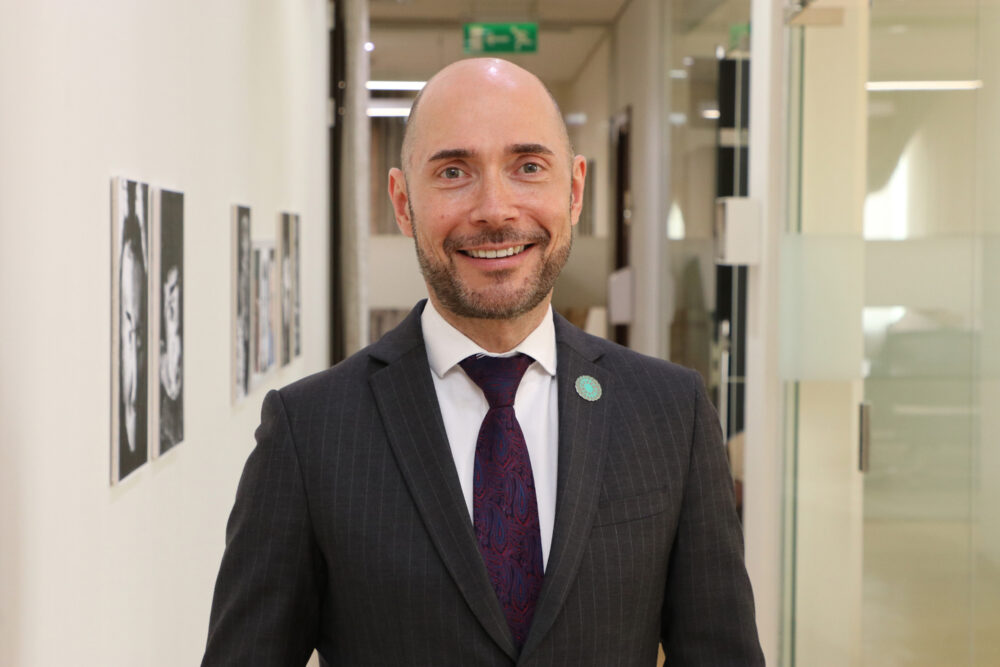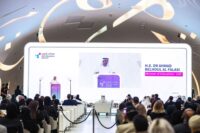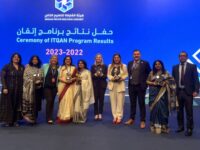Dr Steffen Sommer is the Director General of Misk Schools. He is an accomplished education leader with more than 25 years of experience in senior roles across Europe and the Middle East. Dr Sommer joined Misk Schools as Director General in August 2022, after serving as the Principal of Doha College for seven years. Prior to his time in the Middle East, Dr Somer led top international schools in The Hague, Paris and Lausanne.
As a fluent speaker of six languages, Dr Sommer also served as Head of Languages at Rugby School, one of the UK’s premier independent boarding schools. He was born in Germany and earned his first degree in Language and Linguistics from the University of Leipzig. Following his military service, he worked with car maker Peugeot in France and pursued a PhD in Birmingham, UK, before discovering his passion for teaching.
In addition to his work at Misk Schools, Dr Sommer is actively involved in educational initiatives throughout the Middle East and beyond. He serves as a board member of Outstanding Schools of the Middle East, is a co-founder of the international division of the Headmasters’ and Headmistresses’ Conference (HMC), Vice Chair of the Council of British International Schools (COBIS) and a Fellow of High-Performance Learning (HPL).
Dr Sommer recently spoke to Education Middle East, about his journey as an educator, the challenges and opportunities offered by the educations sector in the Middle East and adapting the HPL philosophy to Arabic.
You seem to have an interesting background, with stints in the military and corporate world before entering education. When did you realise that teaching is your calling?
From the very beginning, I have felt a strong sense that teaching is my calling. Even when I was in school, I saw myself as a natural educator, deeply interested in the complexities of language learning and intrigued by the diverse ways in which my peers and family members learnt. It was during those important years that I began to reflect on the unique learning needs of individuals, recognising the vital role that motivation and access to opportunities play in achieving educational success.
Throughout my professional journey, I have always been eager to help others in their learning, volunteering to coach and support them and deriving huge satisfaction from their accomplishments. So, pursuing a career in education was a natural fit as if I had finally found the missing piece of a puzzle.
As someone who has led many international schools across Europe and the Middle East, how do you see the challenges and opportunities in these regions differing from each other?
There are many more opportunities in the Middle East than anywhere else in the world. The reasons are simple and straightforward. The region has:
- A single-minded focus on and a real ambition for realising national visions which are universally aimed at being the best they can be, at virtually everything, in a short timeframe.
- Highly motivated people who are, by and large, aligned with their country’s vision of which they are all aware.
- Ample funds, which are easily available, coupled with realistic and enthusiastic spending habits.
- Identified education as the main driver for all future successes, the development of human capital being classified as the number-one priority.
In Europe spending is being prioritised differently. Hardly any Western country has increased education funding substantially in recent years, mainly because the education systems seem to have served their purpose reasonably well over time so much so that they have often been exported/copied elsewhere.
While almost all education-related research is generated in the West these days, the substantial changes required to adapt the current systems to the needs of the digital age are clearly deemed too expensive. Contrary to what we have known from research for some time, European education systems have largely remained true to the needs of the industrial revolution with all that means for children’s education and the continuing misalignment between the educational outputs and the requirements of modern economies.
We are told that Misk Schools is open to Saudi nationals only – in fact, it was established specifically to meet the needs of future leaders of the country. How does the school distinguish itself from other such schools that cater to Saudi’s future leaders?
Misk Schools have, in essence, been set up for Saudi nationals but we do have non-Saudis in our schools. Of course, there are other schools with leadership high up on their agendas, which is completely in line with the country’s national vision, for the country will need leaders at all levels.
Misk Schools have been set up as the go-to place for the future leaders of the country, both within the Kingdom and on a global stage, eg within international organisations like the UN, WHO, UNESCO etc. For that reason, we are a Saudi School with a tailor-made (for this purpose) curriculum which leads to the Misk Schools Diploma, a qualification that combines international qualifications and leadership, both theoretical and practical, with Saudi culture and values, all delivered in English. Everything we do, and everything we offer in the way of opportunities, is geared towards excellence, competence, mental and physical agility and adaptability couched in empathy and inclusion.
The benchmark for our entrance tests is high and, given the restricted number of places we have available, a substantial part of our annual income is made available for scholarships so we can always ensure we attract the best. That said, the High-Performance-Learning philosophy, which provides the backdrop for our pedagogy, enables all students to achieve their best while at Misk Schools, the only sizable cohort we take in on an annual basis being in Kindergarten.
Misk Schools is said to be one of the first to fully adapt the High-Performance Learning (HPL) philosophy to Arabic – what did it entail? Any words of wisdom for other schools planning to embrace the approach?
While we are not the first school that has adopted the HPL philosophy as our pedagogical mantra, we are the first to have reconstituted its intrinsic concepts in Arabic, so they make the same sense in the Arab culture. In essence, this means that the glossary, the unique set of terms which forms the backbone of HPL, has been reconceptualised in Arabic.
We have not translated words but rethought concepts looking through the lens of an Arabic speaker. This means that the sememes, i.e., the semantic loads behind the formatives (shapes) of the original English words in the specialised context of HPL have been recreated in Arabic, so they produce the same contextual understanding in the mind of the Arabic speaker as the English terms do in the mind of the English speaker.
My advice to other schools is simple: consider HPL.
The emergence of the HPL philosophy marked the beginning of a new paradigm in education. The strong belief that all children can be high performers is integral to the philosophy which, all said and done, is hard to disagree with, both as a teacher and as a parent. The validity of what seems like a self-fulfilling prophecy is deeply rooted in neuroscience which has proven that the brain is much more malleable than previously thought, and that the IQ can change. Against this backdrop, all school leaders who believe that the raison d’être of a school must be the improvement of children’s intelligence and, with it, their potential, should therefore consider HPL.
At a time when knowledge has become forever more ephemeral, with the life span of its accuracy becoming shorter and shorter, HPL is a safe way of preparing children for the unpredictability of the types of discipline, university courses and jobs that may emerge. In a fast-moving society, the future success of the next generation depends on our ability to innovate, and so we must find the courage to be different and change.
As a passionate linguist and fluent speaker of six languages, what are your thoughts on the importance of multilingualism in education?
Looking at the developments in recent years whereby more and more countries require their international schools to offer parts of the local curriculum and/or devote a substantial part of the curriculum time to learning/maintaining and improving the local language, I can only see the need for multilingual education increasing.
The importance of English as the international lingua franca, and the proven value of international education being uncontested in a more and more globalised world, it will, in the future, have to be balanced more and more against the need for the continued development of local languages and, with it, cultures and heritages. In order to keep, for posterity, the diversity which over time has made the people of the world as uniquely creative as they have been, as de facto net contributors to what we now quite rightly call the beauty of planet Earth, it will be indispensable for children to learn both in their local languages as well as in English.
Against this background and given the notable differences amongst existing education systems due to cultural conventions and priorities, the success of any multilingual education will largely depend on the ability and capacity to create multicultural, indeed intercultural awareness and understanding.
As the Vice Chair of the Council of British International Schools (COBIS), what role do you see international schools playing in the Middle East’s education ecosystem?
If recent developments are anything to go by, I would assign to international education an essential role in the educational ecosystem of the Middle East. The reasons are the following and they have all been identified across the region:
- Due to cognitive diversity, which is so integral to the education delivered in international schools, they will always have an immense potential for innovation which is not only encouraged but also promoted and supported by international membership organisations such as COBIS, CIS [Council of International Schools], NEASC [New England Association of Schools and Colleges] and others.
- The immense thirst for novelty and innovation in Middle Eastern countries, their openness to change, and the funds they are prepared to make available for improving educational standards and outcomes.
- The ever-increasing need for more international schools due to the region’s ambition and desire to be leading internationally in a large variety of fields.
- The still conservative, but now noticeable increasing interest in improving local education systems by learning from high-performing international schools.
- The clear attempts that are now being made to make it easier for international schools to settle in the Middle East and contribute to the educational landscape.
- The clearly emerging signs to be less restrictive to international schools, to evaluate them according to the standards to which their home countries aspire, ie to assess them against the best outside the Middle East, and to then learn from them. International schools are more and more seen as an opportunity rather than a threat.
How do you stay updated on the latest trends and advancements in education, and what’s your advice to teachers to stay on top of their game?
‘Reading, reading and more reading’ (V.I. Lenin) and its more popular 21st century derivatives/alternatives, ie social media (following educational researchers and edrupters), podcasts as well as attending and contributing to educational conferences all over the world.








